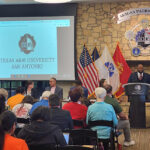Kenneth Mitts, director of finance and administration, said recommendations will be followed by public hearings to explain the committee’s plans for tuition and fees for the upcoming fiscal year, which begins Aug. 31.
Hearings are tentatively scheduled for 2 p.m.-4 p.m. March 7 in Room 254 of Main Campus Building; 3 p.m.-5 p.m. March 8 in Room 304 of Main Campus; and 5:30 p.m.-7:30 p.m. March 8 in Room 128 of Brooks City-Base Campus.
Lisa Pena, executive assistant and scholarship coordinator in the office of the president, confirmed that the executive cabinet met Feb. 20 to discuss tuition and fees.
Consolidating fees
The recommendation to consolidate the fees from 11 categories — such as the technology fee and the student service fee — into one general fee arose from student concerns and complaints.
On the one hand, Mitts said students were confused about why they had to pay for a service that they weren’t necessarily using and said it is difficult to understand all of the fees.
But, he offered other reasons, explaining that consolidating would “provide more flexibility for University utilization for fees.”
If a fee is charged for a specific service, he said, the University cannot use that money for anything else.
“Having all these pots of money ties our hands,” he said. “It’s very cumbersome to budget account for revenues and expenses for all of these pots of money,” Mitts said.
Staff Dissent
University Librarian Stefanie Wittenbach said she understands students’ concerns because she knows not all students use the library’s services, but said paying fees is like owning a house.
“I pay money toward the Alamo Colleges and school district in my area,” Wittenbach said. “But I don’t have kids and I don’t attend the Alamo Colleges.”
She said the money goes to the greater good.
Wittenbach said she and other employees are concerned that departments wouldn’t have ensured funds.
She said the $11 library fee funds staff and personnel, supplies, books, online resources and software.
“The impact could be that some of the money that has come to the library could go to fund something else on campus,” she said. “My concern is less accountability for where the fees are going,” she added.
$10 increase per semester credit hour
The committee also recommended to increase the designated tuition by $10 per semester credit hour. Mitts said designated tuition is determined by the University.
If the recommendation is approved, a student enrolled in 15 credit hours will pay an additional $150 per semester.
Mitts said the increased fee will help offset the budget cuts the University will experience in fiscal year 2012-13.
Last fiscal year, the Legislature awarded the University $40 million through a tuition revenue bond, but for fiscal year 2012-13, the Legislature cut funds by more than $4.8 million even though enrollment increased 13 percent (from 3,120 to 3,553 students between fall 2010-11).
Mitts said that some of the cuts were resolved with formula funding, but it was not enough. Therefore, the committee decided to recommend the $10 increase in tuition.
He said with the enrollment growth, the University wants to add programs and hire new faculty and staff.
“Those needs exceed the revenue generated by (the tuition increase),” he said, but added that it will help offset the reductions in state funding.
Recreational Fee
In other matters, the committee discussed an additional fee for recreational activities to develop club sports or intramurals, which Mitts said Ferrier is very interested in adding.
The fee requires a student vote. Laura Pantano, assistant vice president of student engagement and success, is working to add the recommendation to the Student Government Association ballot during the month of March. SGA elects new senators each spring. Voting begins 8 a.m. March 26. Read about elections.
According to the meeting minutes, Eddie Castro, graduate student in the School of Education, said he thought students would be interested in sports, but didn’t think non-traditional students would vote to approve a $175 recreational fee.
David Franco, graduate student in the School of Education, agreed.
Mitts said the Texas Education Code allows the University to charge a fee up to $175 for fall and spring semesters and $87.50 for summer.
According to the minutes, Mitts said the fee could be as low as $10 per student.
Pantano suggested a $30 fee, which would allow the University to spend about $200,000 per year on recreation.
Mitts added that the results wouldn’t be effective if students who vote were given the choice to choose between $0-$175 for a recreation fee, therefore, Mitts explained that the committee is trying to come up with a proper number to put on the ballot.
In the meeting, Pantano moved to determine the actual amount based on estimated costs of programs planned. The dollar amount will be announced before voting.
Mitts said, in the future the fee can fund a recreational facility or softball and baseball fields on or near Main Campus, adding that these are long-range plans.
Other sports discussed by the committee included club sports such as soccer, basketball and softball.
Dr. Mary Ann Grams, vice president for student affairs, said in the meeting that these sports aren’t expensive, but would require funding for travel, referees and facility clean-up.
Student fee advisory committee
The University’s student fee advisory committee is comprised of five students and four employees who meet annually in the spring. The committee serves Ferrier by making fee recommendations for student services.
Recommendations are supported by the Texas Education Code 54.5032, which stipulates that colleges and universities can form a committee to discuss student fees.
Members of the student fee advisory committee include: Mitts, Pantano, graduate studies Director Gary Coulton and business Professor Josephine Sosa-Fey.
Student committee members are as follows: graduate students Castro, Franco and Jennifer Hambright of the School of Arts and Sciences, and undergraduate students Tabitha Gentry of the School of Education and Corey Swan of the School of Business.
Faculty and staff members on the committee are appointed by Ferrier, and Student Government Association appoints three students to serve two-year terms and two students to serve a one-year term.
Gentry and Swan are serving for one term and Castro, Hambright and Franco are serving for two terms. Castro is completing his second term this year.
Resources:
According to the Texas Education Code, “before recommending the student fee budget to the governing board of the institution, the president shall consider the report and recommendation.”
Fiscal year 2011-12 fees:
• program fee $15 per semester credit hour
• library $11 per semester credit hour
• international $3
• transcript $10
• advising $10 per semester credit hour
• student ID $7 per semester credit hour
• distant learning $40
• energy $3 per semester credit hour
• safety and security $7 per semester credit hour
• technology $15 per semester credit hour
• student service $14.30 per semester credit hour
Mitts said all the fees are open to view on the business office’s Web Page.
To view a list of tuition and fees visit http://www.tamusa.tamus.edu/businessoffice/2011-2012tuition.htm.
The left column titled “tuition” is determined by the state, which Mitts said the University doesn’t address.






